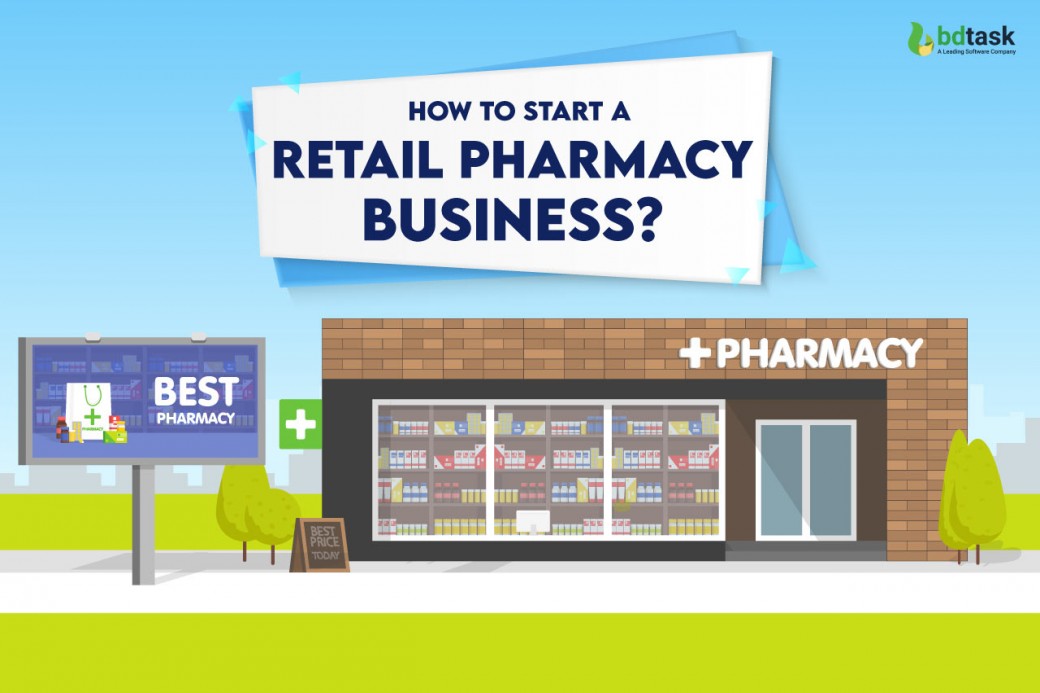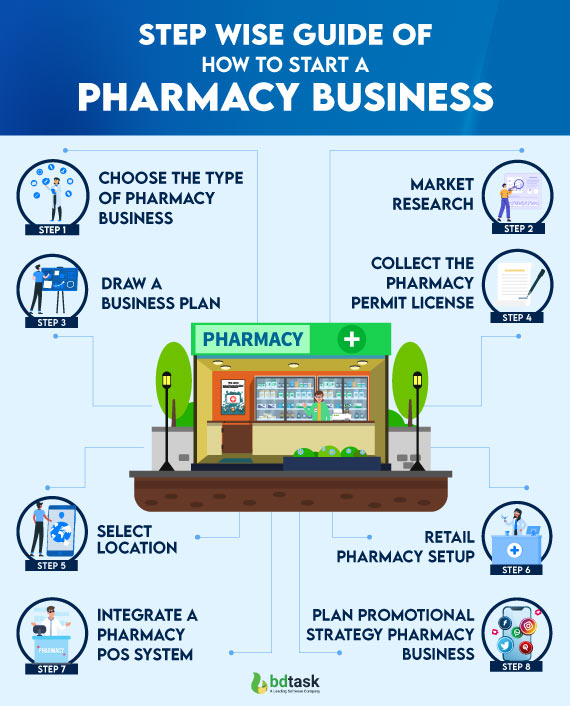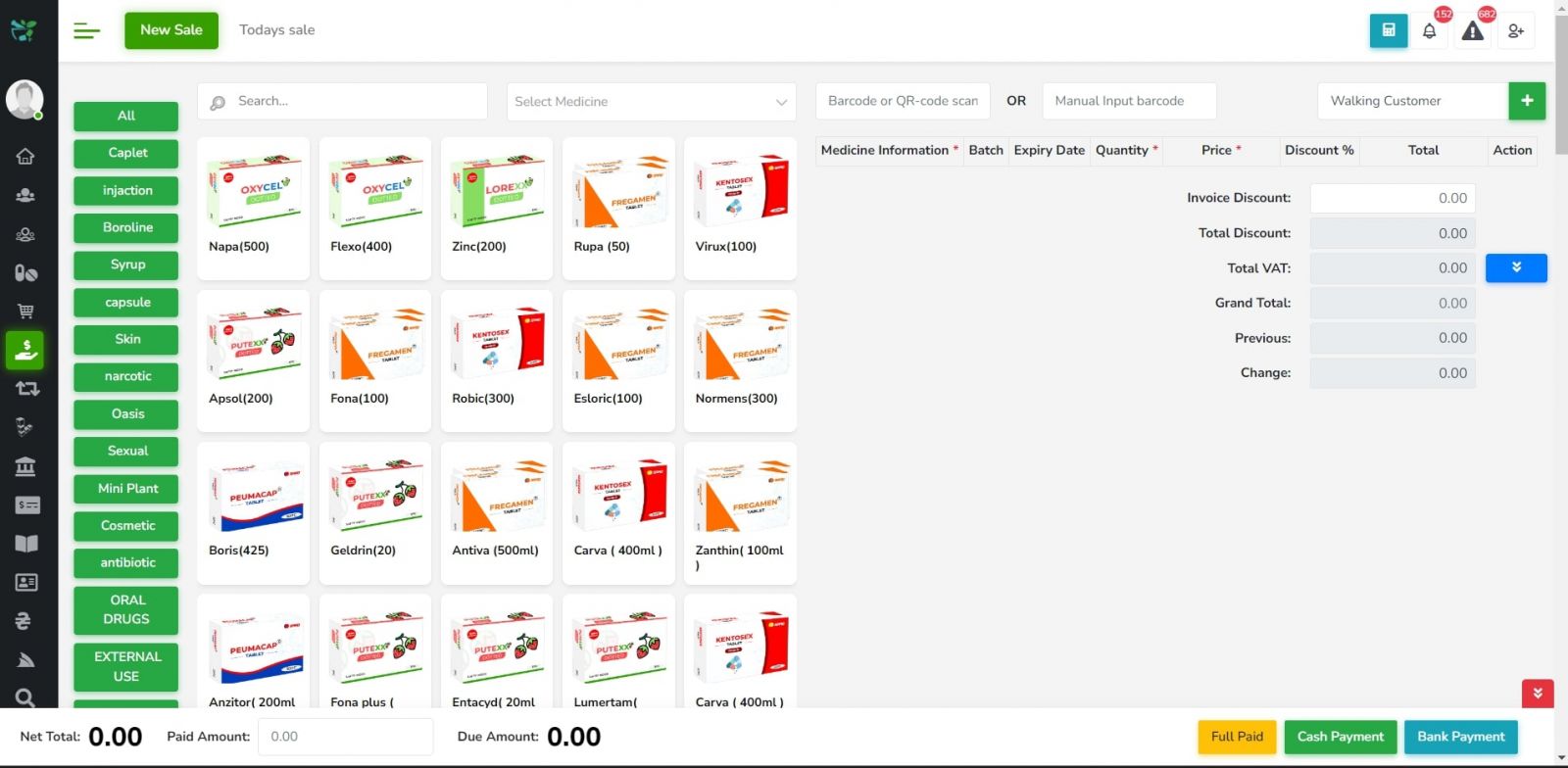How To Start a Retail Pharmacy Business?-Path Toward Success

Are you thinking of starting a business of your own? Then, I would suggest starting a retail pharmacy business in your neighborhood. Yes, it will be daunting to start a pharmacy business, but it is still a noble business venture.
But do you know how to start a retail pharmacy business? What steps must you go through to start a retail pharmacy business?
A retail pharmacy is the one that is considered to be the nearest pharmacy in that neighborhood. In Retail pharmacy, you will find all types of medication, medication counseling, dispensing prescription medication, on-counter service, and health-related equipment.
Retail pharmacy is always the nearest neighborhood's live-saver; purchasing any medication in retail amount is considered the local pharmacy store and is open 24*7.
Hence, in this blog, we’ll share the step-wise guideline of how to start a retail pharmacy business. And also a small guidance on how you can manage the retail pharmacy.
What Is Retail Pharmacy Business?
A retail pharmacy business is another criterion of pharmacy that operates as a retail storefront, prescription and suggested medications and various medical devices to consumers. These pharmacies are commonly found in the nearest neighborhoods, corners of grocery shopping centers, or within larger retail establishments.
Key features of a retail pharmacy business include:
- Prescription Medications
- Over-the-counter (OTC) Medications
- Health and Wellness Products
- Customer Service
- Insurance Processing
- Online Presence
- Compliance with Regulations
Step Wise Guide Of How To Start A Pharmacy Business?

Of course, starting a pharmacy business is challenging because, as a pharmacist, you have to take care of all the customers with the utmost importance. After all, it is a matter of getting cured of the disease.
Even if you are not a degree-holder pharmacist, you still can work in a pharmacy. You can monitor the pharmacy inventory, take care of the customers, and track the customer demand for any specific medicine.
Step-1: Determine The Type Of Pharmacy Business You Want To Start
There are different criteria for pharmacy business, but it all depends on which type of pharmacy business will be fit for you. Below, I have mentioned different types of pharmacy businesses. Please go through them and choose the one you desire.
- Independent pharmacy
Independent pharmacies are often owned and operated by small entrepreneurs. Independent pharmacies operate individually and usually come in small and medium sizes.
Independent pharmacies usually provide personalized, community-oriented health care services. Independent pharmacist owners are often flexible when providing one-to-one service to the community and often develop a closer relationship with their customers.
- Retail Pharmacy store
A retail pharmacy store is a pharmacy store that is considered to be the nearest pharmacy in the neighborhood. A Retail pharmacy store can be both an independent and chain pharmacy. In retail pharmacy, a customer can purchase prescribed and non-prescribed drugs.
Moreover, retail pharmacy businesses also have expertise in selling different medical devices, providing different healthcare advice, filling out prescriptions, etc.
- Chain pharmacy
Chain pharmacy is also another type of retail pharmacy, but it operates in multiple locations under the same brand name. This chain pharmacy can be both a local or an international chain franchise pharmacy. Always maintain a standardized and similar service for all the outlets.
- Community Pharmacy
Community pharmacy is also another independent pharmacy, usually owned by localians. Generally, community pharmacies are small in size and serve the local customers of the community.
The main focus of community pharmacy is to provide personalized service to customers. Unfortunately, community pharmacies might face competition with large chain pharmacies due to marketing capabilities or advanced technological differences.
- Compounding pharmacy
Compounding pharmacy is another unique type of pharmacy where you can create any prescribed customized medication. Community pharmacy specializes in making different medications, mixing, combining, or altering ingredients as prescribed by the doctor.
- Specialty pharmacy
The main focus of specialty pharmacies is to provide medication for some complicated diseases, such as cancer, HIV/AIDS, multiple sclerosis, rheumatoid arthritis, hepatitis, etc. Indeed, the medications available in the specialty pharmacy are high priced, and not every medicine is available.
- Family-owned pharmacy
Family-owned pharmacies are usually different from chain pharmacies and operate in the form of independent pharmacies. Family-owned pharmacies are run and operated by the family members.
- Hospital retail pharmacy
Generally, a hospital pharmacy is situated inside a hospital and promises to offer the medicine the enlisted hospital doctors prescribe.
- Online Pharmacy
Online pharmacy is basically what we consider a telemedicine service. Telemedicine service is a new digital way of providing medical service to everyone. Telemedicine offers video calls with doctor services, online prescriptions, different ranges of medications, and healthcare equipment, which can be accessed through websites or apps.
Step-2: Market Research Needs To Be Done
To start a pharmacy business, the initial step is to do some random market research and then decide whether or not to invest and move forward. Doing market research helps to uncover different aspects of the pharmacy industry.
- Competitor Analysis
Indeed, healthcare equipment is a necessary item for life; hence, it is an all-time profitable business no matter how many competitors are in the market.
However, it's still better to understand and analyze the neighborhood's existing competitors. Find out the following categories:
a) Strengths and weakness of the existing pharmacy in the chosen location
b) Identify which is type of pharmacy is more prevalent among customers
c) Set a pharmacy business model
d) What types of services do they offer
e) Plan some unique strategies for your pharmacy
- Recognize The Target Market
Before you start your pharmacy operation, you also need to analyze whether the target audience needs it in the market.
Proper understanding and identifying the potential customer helps personalize your pharmacy and grab more customer attention. And when you measure the target audience, you should find the following:
a) Who will be your potential customer
b) Note down the demographics (age, gender, standard of living)
- Analysis The Demographic Data
You can get help from the U.S. Census Bureau, nearest hospitals, or local health departments to collect information about popular disease names and medication lists.
Also, gather information about the age, gender, and health status of the location where you will establish your business.
- Gather Feedbacks
Collect feedback from regular customers from both online and physical stores. Seek information on which types of new service customers expect from an unknown pharmacy and want to know the customer experience.
Step-3: Draw A Business Plan For Your Retail Pharmacy Business
After you are done with pharmacy business market research, you can now draft a retail pharmacy business plan. So that you have a clear direction on which step to take and when while operating your pharmacy business.
- Executive Summary
To start a successful retail pharmacy business, you obviously need a potential retail pharmacy business model. A retail pharmacy business plan must have the following points: mission statement, business objectives, product and service lists, and marketing strategies.
- Market analysis
Plan a promotional campaign based on the data collected from market research, for instance, competitors' details, target market, and market trends.
- Business model
The retail pharmacy business model holds the information about the outline of the pharmacy's store structure, the number of staff that will be needed, and the legal clearance documents (licensing and insurance).
- Service and product
This section will hold the list of the products and services you are going to offer in your pharmacy. The list of products, for example, the medication list, the list of medical equipment, and the list of services, for example, home delivery, physiotherapy sessions, etc.
- Marketing and sales strategies
This section will hold the list of marketing strategies or promotional campaigns you will apply in your pharmacy to generate revenue. Pharmacy promotional ideas, for example, traditional advertising, social media ads, etc.
- Budget planning
You can hire any financial advisor who can forecast revenue & expense documents. You can plan a forecasted break-even analysis, profit & loss statement, and cash flow statement. Hence, will get an estimated budget chart before starting a pharmacy business.
Step-4: Acquire The Pharmacy Permit License
A pharmacy permit license will be mandatory before starting a pharmacy business. You need to have clearance of all the legal rights involved in operating a pharmacy store.
- State pharmacy license
Since medicine stores are related to healthcare, you need to clear pharmacy licenses to start a pharmacy business. You can collect this pharmacy from the state's board by showcasing the education and training certificates.
- Business License
Even though the requirements of the pharmacy vary from state to state, obtaining a pharmacy business license from the local government is mandatory.
- Drug Enforcement Administration (DEA) Registration
You'll require an application, background check, and registration fees to get a DEA registration.
- National Provider Identifier (NPI) Number
You will need an application and registration fees to grant an NPI number.
- Building and fire permits
Building and fire permits are only required based on the location & building type of your pharmacy business. This license ensures the building's strength and fire safety.
Pharmacare - Pharmacy Management Software | Pharmacy Software | Medical Store Software
Step-5: Select The Perfect Location For Your Retail Pharmacy
How profitable or how many customers you will get in your pharmacy depends on which location you choose for your pharmacy. Below mentioned key factors to consider while selecting the location.
- Demographics
It's better if you run a small research to track down the demographics of the designated location (population, age range level, standard of living, income level, and education). Opening a pharmacy beside a hospital or nursing home would be best.
- Competitors
The first rule of starting any business is to research your competitors. Like the universal rule, in the pharmacy business, you also study the population and type of pharmacy nearest your pharmacy store.
- Accessibility
If you have the data of your potential target customer, then you can easily figure out which location is profitable for you. For example, suppose you are an independent retail pharmacy, and your target audience is to serve a residential neighborhood. In that case, you should set up your pharmacy center in the residential area.
- Building and zoning
Ensure the building or the location meets all the building codes and safety requirements.
- Cost
Rent, utilities, equipment, staff payrolls, and location expenses are the main costs of a pharmacy.
- Local Laws and regulations
Research the local competitors and what type of pharmacy license or local laws and regulations are needed to maintain or operate a pharmacy business.
Step-6: Retail Pharmacy Setup
This part of the retail pharmacy business will involve the details of the factors needed to set up the pharmacy store.
- Establish Relationships With Suppliers
It's better to establish a sweet relationship with pharmaceutical suppliers. Research the existing local pharmacies' supplier's contact address and know about their delivery service. Look for a supplier with the best competitive price and reliable delivery service.
- Purchase Medical Equipment And Supplies
The healthcare sector is one crucial department; hence, stocking up on updated medical equipment and medication is necessary. Therefore, ensure your pharmacy supplier supplies you with high-quality equipment and drugs.
- Hire Pharmacy Staff And A Certified Pharmacist
Make sure you hire one certified pharmacist and one/two general staff. The general must have the capability to handle a counter, retail pharmacy inventory, and operate the pharmacy management system.
Disclaimer##If you already have a certified pharmacy, then there is no need to hire a professional pharmacist.
- Develop Policies And Procedures
While operating a pharmacy, ensure you have developed strict pharmacy policies and procedures that will apply to staff. Policies and procedures include dispensing procedures, inventory management, patient privacy, etc.
Step-7: Integrate A Efficient Pharmacy POS System
Integrating a Pharmacy POS system is one of the best investments you can make in your pharmacy store. And by incorporating it, you can smooth the payment processing, streamline day-to-day operations, inventory tracking, etc.
- Payment processing
Whenever any customer arrives, they expect a smooth payment processing. Hence, an efficient pharmacy POS system can help you to manage all types of payment processing, including credit and debit card payment processing.
Pro tips## With Pharmacare-pharmacy management software, you get an effective pharmacy management solution and integrated with a smooth GUI Pharmacy POS system.

Image source: Pharmacare GUI POS
- Automated Inventory System
Every pharmacy must have an automated inventory system because keeping track manually is hard. However, an automated pharmacy inventory system will assist you in tracking down the stock level and expiry dates and also identify the popular medication sought by customers.
- Reporting And Analytics
A dynamic pharmacy management system can automatically generate a yearly/monthly report and analytics. The pharmacy store report will consist of sales details, a list of available stock, and other miscellaneous expenses in the store.
- Improved customer service
If you use smooth pharmacy billing software, you can easily win customer loyalty. Moreover, it's also very necessary to provide the best hospitality service to the counter customer. Providing customer service helps to generate trust and loyalty with the customer.
Integrating a Pharmacy POS system is one of the best investments you can do in your pharmacy store. And by integrating it you can smooth the payment processing, streamline day to day operation, inventory tracing etc.
Step-8: Plan Promotional Strategy For Your Pharmacy
Even Though most pharmacy owners ignore this step, whoever applies different promotional strategies gets better results and more customer reach. After all, promoting business on different social media is the new trend now.
-
Build a Website
In this online-dependent era, where people invest more time over the internet, it's better to have a website in this era. You can follow the basic steps of the website development lifecycle to develop an interactive website.
The pharmacy website will include some basic information, for instance, location, hours of operation, service, and contact information.
- Social Media Marketing
Promoting your pharmacy business over different social media platforms helps you reach and attract loyal customers better.
Indeed, the thought has haunted your mind: how to start a retail pharmacy business? Starting a pharmacy requires careful planning and adherence to various regulations.
Starting and running a retail pharmacy business requires a combination of pharmaceutical knowledge, business awareness, and a commitment to meeting the community's healthcare needs.
Continuous adaptation to industry changes and focus on customer well-being are essential for long-term success in this competitive field.










